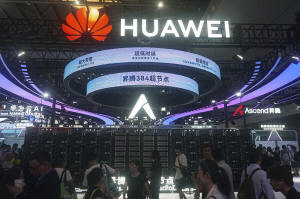How Huawei plans to outperform global tech leaders with less powerful
chips
[September 19, 2025]
BEIJING (AP) — China's Huawei Technologies said Thursday that it would
roll out the world's most powerful AI computing clusters over the next
two years as it seeks to outperform global leaders despite relying on
less powerful domestic semiconductors.
China is racing to develop its own technology as America restricts what
can be sold to China, including its most advanced chips. At the same
time, the Chinese government has reportedly told companies to stop
buying some American chips as it seeks to transform China into a global
tech leader and one that is less reliant on imported components.
Huawei, at the forefront of efforts to develop home-grown technology,
said at an annual customer event in Shanghai that it would launch new
“superpods" in late 2026 and late 2027. That's computer industry lingo
for a group of interconnected computers that, in Huawei's case, combines
the power of thousands of chips.
That immense power is needed to run models in the burgeoning field of
artificial intelligence, an area of hot competition between the U.S. and
China.
“This is a significant milestone,” said Charlie Dai, a technology
analyst at the research firm Forrester Research. "It signals a stronger
push toward self-reliance and resilience in the face of export
restrictions.”
Huawei announced plans to release the Atlas 950 and 960 superpods over
the next two years. Dozens of the “SuperPoDs,” as Huawei brands them,
could be connected to form what Huawei said would be the world’s most
powerful “SuperClusters.”

[to top of second column] |

Visitors pass by the Huawei Atlas 900 A3 SuperPoD exhibited at the
World Artificial Intelligence Conference in Shanghai, China, July
28, 2025. (Chinatopix Via AP)
 The 950 and 960 are the most
powerful superpods in the world and would remain so for years to
come, a company news release said, based on product road maps from
others in the industry.
The challenge for China is how to keep pace with American
competitors such as Open AI and Google without access to the world's
most powerful semiconductors, notably those from America's
market-leading Nvidia. The answer has been to use many more chips
and develop the architecture to make them work well together.
“Our strategy is to create a new computing architecture, and develop
computing SuperPoDs and SuperClusters, to sustainably meet long-term
demand for computing power,” Eric Xu, the current rotating chairman
of Huawei, told the customer conference, according to a transcript
provided by the company.
Huawei, based in Shenzhen in southern China, also announced plans to
launch new AI chips in its Ascend series over the next three years.
The Atlas 950 and 960 superpods would be based on the Ascend 950 and
960 chips, due out in 2026 and 2027. A planned Ascend 970 chip could
follow in 2028.
All contents © copyright 2025 Associated Press. All rights reserved |